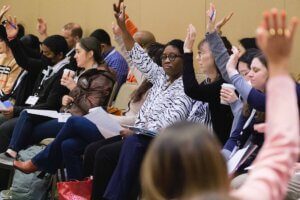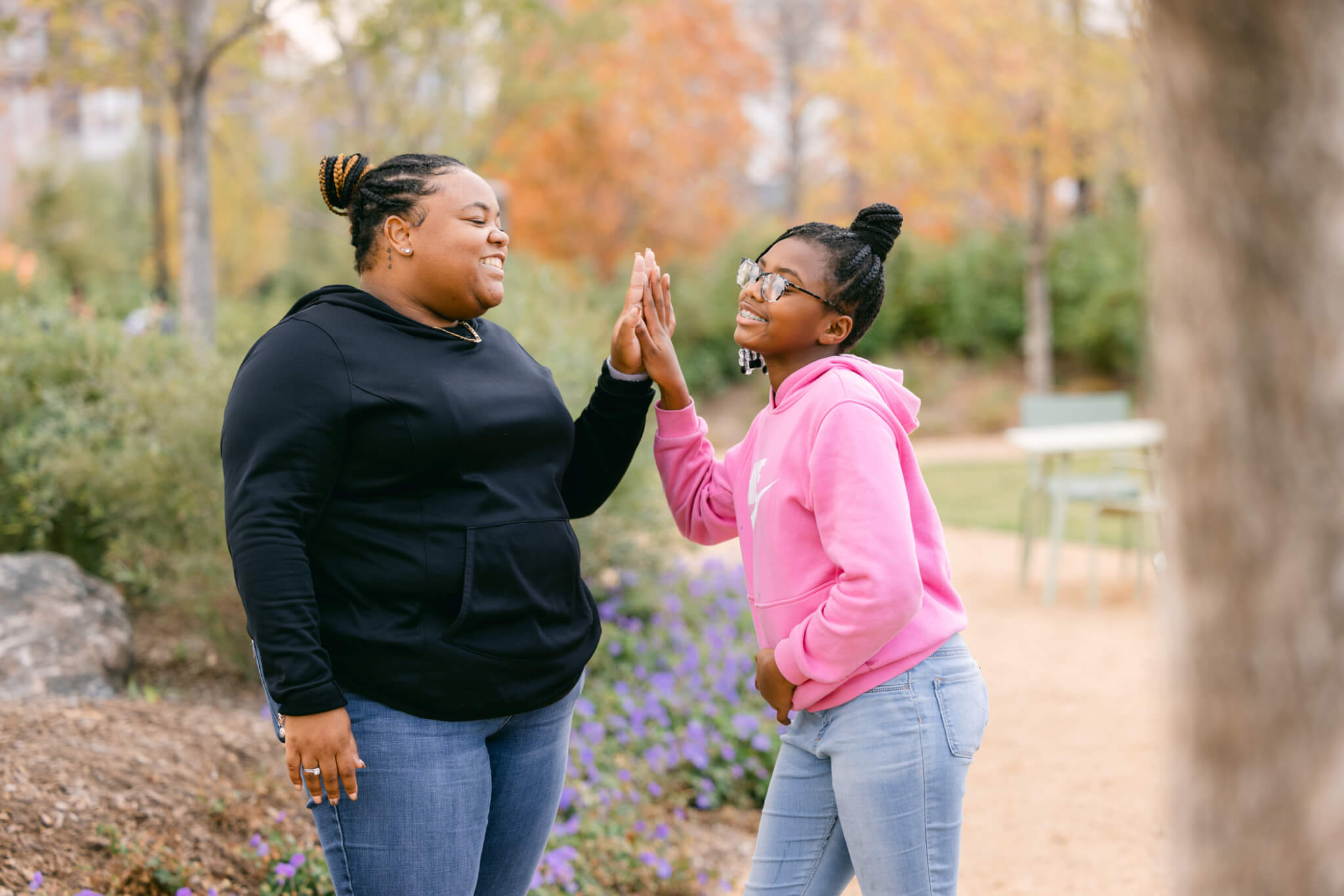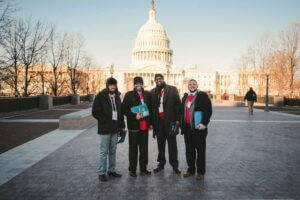FY24 Mentoring Federal Funding Summary
Due to spending caps agreed to last summer in the Fiscal Responsibility Act, FY24 presented a challenging federal appropriations environment. As such, many programs were level-funded or cut, including the Youth Mentoring Grant (the only mentoring-specific line item in the federal budget), which will be funded at $104 million, a cut of $3 million.
Nonetheless, the mentoring movement still secured additional direct investment: 10 community funding projects (or earmarks), submitted by bipartisan Members of Congress, were included in the final appropriations bill, totaling $3,413,000 in direct investment into mentoring programs:
- Sen. Booker (D-NJ): Newark Mentoring Movement, for a school-based mentoring initiative. $135,000.
- Sen. Fetterman (D-PA): Big Brothers Big Sisters of Greater Pittsburgh, PA, for mentoring programs at Woodland Hills and Clairton City School Districts. $235,000.
- Sen. Shaheen (D-NH): Big Brothers Big Sisters of New Hampshire, for a mentoring program for at-risk youth. $260,000.
- Sens. Ossoff (D-GA) and Warnock (D-GA): Big Brothers Big Sisters of Metro Atlanta, Inc., for youth mentoring. $250,000.
- Sens. Capito (R-WV) and Manchin (D-WV): Mission West Virginia, for a mentoring program. $225,000.
- Sens. Blumenthal (D-CT) and Murphy (D-CT): Mystic Seaport Museum, for mentoring, STEM, education, and enrichment, including student stipends. $570,000.
- Sen. King (I-ME): RSU 13, for mentoring, education and support services for at-risk and system-involved youth. $450,000.
- Sen. Casey (D-PA): Summer Search Philadelphia, for mentoring programs. $200,000.
- Rep. Kamlager-Dove (D-CA): Los Angeles Urban League, for Transitional-Aged Youth Mentoring and Career Development. $963,000.
- Rep. Hunt (R-TX): Big Brothers Big Sisters Lone Star for mentoring. $125,000.
See below for a full analysis of the funding level for each program that MENTOR tracks:
Justice Programs
- The Youth Mentoring Grant Program
The only mentoring-specific line item in the federal budget, this program increases the capacity of state and local jurisdictions and tribal governments to incorporate evidence-based findings of best practices and principles. It also funds the National Mentoring Resource Center (NMRC), which provides free or low-cost technical assistance to programs across the country. This program received a $3 million cut, for a new total of $104 million.
- Children Exposed to Violence Initiative
These funds, administered through OJJDP, are awarded to organizations to develop, maintain, or enhance programs designed to prevent future violence. Funds from this program can be used to train and coordinate for educational and after-school programs on strategies to safely and confidentially identify children and families experiencing violence and properly refer children exposed and their families to services and violence prevention programs. This initiative is funded at $9 million, a $1 million decrease from last fiscal year.
- Juvenile Justice and Delinquency Prevention Act (JJDPA) Title II
Funds in this formula grant program support innovative state efforts to adhere to standards that reduce the risk of harm to court-involved youth, ensure fair treatment of minority youth, improve the way systems address delinquent behavior, and ensure citizen involvement and expertise through State Advisory Groups. The program received a $10 million cut, to a total funding level of $65 million.
- Juvenile Justice and Delinquency Prevention Act (JJDPA) Title V, Local Delinquency Prevention Program
This discretionary grant program (“PROMISE Grants”) supports programs designed to prevent delinquency and address the unmet needs of youth facing risk at the local level through data-driven, evidence-based programs. It received a total funding level of $55 million, a $10 million cut from FY23.
- Community-based Violence and Prevention Initiative
The bill includes $50 million for a community violence intervention and prevention initiative, which is flat funding from FY23.
Labor/Workforce Programs
- The WIOA Title I Youth Activities Program:
This is a formula-funded state grant that helps out-of-school youth and low-income in-school youth with barriers to employment by providing them with services that prepare them for employment and postsecondary education. The program received $948 million for FY24; flat funding from FY23.
- YouthBuild
This discretionary grant program helps provide disconnected youth with work readiness and industry-driven credential attainment opportunities. YouthBuild also provides significant support services, such as mentoring. For FY24, the program received flat funding of $105 million.
- Reentry Employment Opportunities
This program provides current or formerly incarcerated adults and youth involved in the justice system with occupational skills training leading to industry-recognized credentials and apprenticeships for employment in industries and occupations that offer competitive wages and opportunities for advancement. It also provides pre-release and comprehensive post-release services, including mentoring. This program received flat funding of $115 million for FY24.
- Career Pathways for Youth Grants
Within the Dislocated Worker National Reserve program, there is flat funding of $20 million in FY24 for grants to support national out-of-school time organizations that serve youth and teens and place an emphasis on age-appropriate workforce readiness programming to expand job training and workforce pathways for youth and disconnected youth.
Education Programs
- Full-Service Community Schools
This program provides grants to local educational agencies (LEAs), in partnership with community-based/nonprofit organizations, to make available comprehensive academic, social, and health services for students, their family members, and community members in school settings through service integration and coordinated strategies for target youth and their families experiencing poverty. Grantees must secure matching funds. This program received flat funding of $150 million for FY24.
- Title IV-A/Student Support and Academic Enrichment Grants
Grants from this flexible block grant program authorize activities in three broad areas: providing students with a well-rounded education; supporting safe and healthy students; and supporting the effective use of technology (mentoring falls within of these buckets). The program received flat funding of $1.38 billion for FY24.
- 21st Century Community Learning Centers
This program enables communities to establish or expand centers that provide additional student learning opportunities through before- and after-school programs and summer school programs aimed at improving student academic outcomes. It received flat funding of $1.33 billion for FY24.
Health and Human Services
- Project AWARE
This Substance Abuse and Mental Health Services Administration (SAMHSA) program uses funds to build the capacity of State Educational Agencies, in partnership with State Mental Health Agencies overseeing school-aged youth and LEAs, and in collaboration with community-based organizations, with the purpose of increasing awareness of mental health issues among school-aged youth and providing training for school personnel and other adults who interact with youth to respond to mental health issues. Project AWARE received $140 million for FY24; flat funding from last year.
- Community and Youth Violence Prevention
Within the CDC’s funding for Injury Prevention and Control, $18.1 million is for youth violence prevention; flat funding from last year.
CNCS/AmeriCorps
- Volunteer Generation Fund
Within CNCS/AmeriCorps, this fund supports State Service Commissions in helping nonprofit and voluntary organizations across the country more effectively recruit and retain volunteers and increase their impact on addressing community challenges. The program received flat funding of $8.56 million for FY24.


